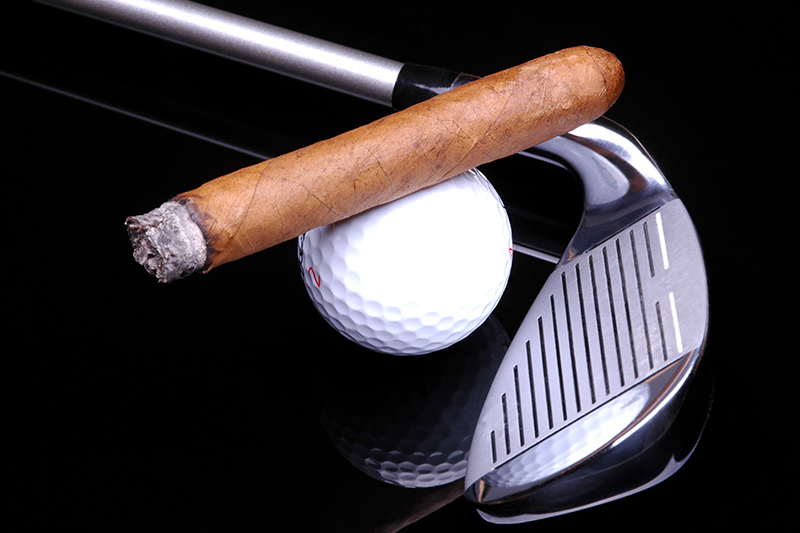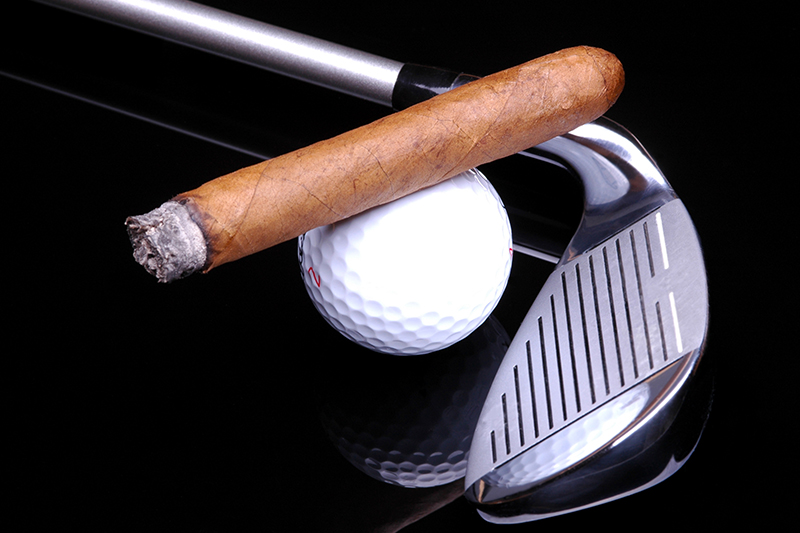
New “research” from the University of North Carolina (UNC)is proving that even one of America’s last great pastimes, golf, is not safe from the nanny-state agenda. In a research letter published in Nicotine & Tobacco Research, analysts Selena Kleber, Remi Philips, and corresponding author Adam Goldstein, MD, MPH, Director of Tobacco Intervention Programs at the University of North Carolina School of Medicine, examined reports of tobacco sales, sponsorships, and policies at professional golf tournaments. The immediate red flag as to the objectivity of the “research” is the reference to cigarettes in virtually every sentence with cigars.
In their paper, the researchers attempt to tarnish the celebrated tradition of cigar enjoyment on the fairways, by postulating that because golf courses sell cigars and do not have smoking policies thus golf course patrons’ health may be at risk. While these claims not only infringe upon personal liberties of Americans who choose to enjoy a cigar while golfing, they are also a nonsensical concern.
Truly objective government studies have clearly indicated the statistically irrelevant threat to public health by the occasional enjoyment of a cigar. Such studies further denote virtually undetectable statistics linking premium cigars to inhalation, addiction and mortality. Related studies have also substantiated to lack of youth access and appeal of premium cigars. Of course you wouldn’t get such data from survey interviews from the staff at the local golf course, or even from the golf staff at courses which host PGA events.
Their basis is that secondhand smoke is a common issue on a golf course averaging acres of spaced-out, outdoor, open-air space is even proven wrong in their own study. Of the golf courses surveyed in their research, “almost all (92%) said they had not received complaints about secondhand smoke exposure from cigarettes or cigars” with 77% of the courses indicating that their club did not sell cigarettes.”
This reminded us of the debate surrounding the effort to ban smoking in New York City parks, when Dr. Michael Siegel as an acclaimed public health authority stated “smoke quickly dispenses in the open air.” He states, “…no evidence demonstrates that the duration of outdoor exposure – in places where people can move freely about – is long enough to cause substantial health damage.” He further noted “…trying to convince people that even transient exposure to secondhand smoke is a potentially deadly hazard, smoking opponents risk losing scientific credibility.”
Let’s keep in mind that this “research letter” was based on surveys and correspondence with golf course staff…asking them questions surrounding issues of public health and tobacco control. That’s the moral equivalent of asking your cardiologist how to improve your short game or how to get rid of that slice.
Further to consider, if golf courses were deemed essential and safe during the COVID-19 pandemic, with the state governments not concerned of the spreading of the virus due to the vast outdoor space that a golf course provides, then worrying about potential secondhand smoke on the back nine sounds preposterous.
Ultimately, what their “research” is really trying to do is to use golf courses as an avenue to expand the conversation on outdoor smoking bans and further strip Americans of their personal liberties. As some U.S. cities have banned smoking on golf courses, they hope their “research” brings that conversation to your hometown.
The only thing that their “research” got right was in acknowledging, “Cigars also remain a cultural symbol inextricably tied with celebration, including relationships between cigar use and golf, as golf courses remain places where smoking cigars are frequently acceptable.” We agree. Cigars and golfing are the perfect pairing of relaxation and celebration, and that’s an American freedom worth defending.
– This article was contributed by the PCA Government Affairs team.

